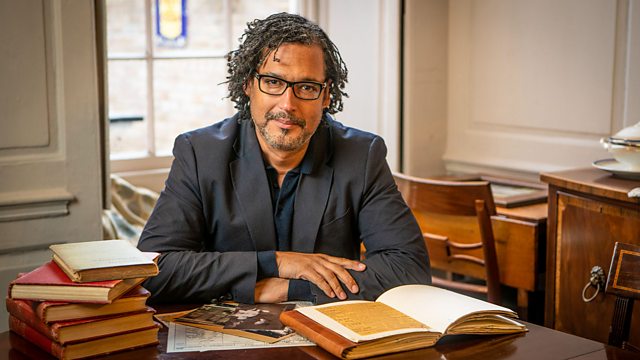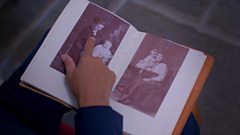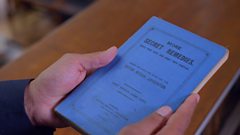
Episode 3
Investigating the residents of No 10 Guinea Street, David Olusoga discovers a struggling entrepreneur and a World War I tragedy, and unmasks the mysterious Mrs Watson.
In this episode, David follows the house’s fortunes from the 1880s through to the end of the First World War, as it slides down the social scale and moves into multiple occupancy. Along the way, David discovers stories of epidemic disease, a backstreet quack doctor and a World War I tragedy.
David begins his journey by investigating a newlywed young couple, Owen and Louisa Pow, who move into the house in the early 1880s. The couple soon have a baby daughter, Emma, but after her tragic death from tubercular meningitis, Owen Pow embarks on a new venture, setting up his own small business as the proprietor of a milk tavern.
Milk taverns like Owen’s were a response to the temperance movement, a mass campaign to control alcohol abuse. However, Owen’s new business falls into trouble within months of opening. An attempt to increase his profits by watering down the milk sees Owen taken to court and prosecuted. The business survives this blow, but then another crisis develops. New scientific research reveals a causal link between milk and tuberculosis, the very disease from which the Pows’ baby died. As the owner of a milk tavern, Owen struggles to keep his business afloat.
By the late 1880s, the Pows have moved on, and their landlord sells the house at Number 10 Guinea Street. The buyers are a sprawling family called the Wallingtons. They live in the house for several years before moving to the countryside and renting out Number 10 to tenants.
Tracing these next occupants proves a difficult task, but David soon finds a clue in a mysterious advertisement in a local newspaper from 1909. It offers an unspecified ‘female remedy’ from a ‘lady specialist’ in 10 Guinea Street, going by the name of Mrs Watson. It appears to be written in coded language, the reason for which soon becomes clear - further advertisements make clear that this ‘remedy’ contains the herb pennyroyal, well known to induce abortions.
Tracking down the person providing this quack remedy proves to be a difficult task, as the name Mrs Watson appears to be a pseudonym. But by putting together the evidence piece by piece, David discovers another trail that leads him to an elderly herbalist named James Stewart, who lives in the neighbouring house. As David soon discovers, Stewart and his family had a sizeable clandestine business dealing in remedies for unwanted pregnancy and sexual dysfunction.
The next residents of 10 Guinea Street are the Curleys, a large and close-knit family who occupy the house for several decades. They are Emily and George, who live here with their four sons and three daughters. David manages to track down a living relative - Emily and George’s granddaughter Jean Chamberlain. Jean is now a sprightly 91-year-old who was born at Number 10 Guinea Street and remembers the older generations well.
Jean’s strongest memories are of her three aunts, Esther, Rosina and Jane Curley. Looking into their records, David uncovers a remarkable story. He first follows the middle sister Jane Curley, who marries in the local church in September 1914, just two months into the First World War. Jane and her new husband Albert spend a year together before Albert leaves 10 Guinea Street for the army. Jane is pregnant when he is sent to the Western Front.
Remarkably, the lives of Jane’s two sisters, Esther and Rosina, follow the same pattern. Both marry local men and see their husbands sent to the Front when they are pregnant or caring for small children. The sisters remain at Number 10, supporting one another while the war rages. David then follows their story through the Battle of Passchendaele, one of the deadliest battles of the war, which changes the lives of Curley family forever.
Last on
More episodes
Previous
Next
Clips
-
![]()
A family torn apart by war
Duration: 01:23
-
![]()
Discovering the truth about Mrs Watson's 'remedy'
Duration: 02:03
Music Played
Timings (where shown) are from the start of the programme in hours and minutes
-
![]() 00:04
00:04Pontarddulais Male Choir
Jesus Shall Reign Where'er The Sun
-
![]() 00:38
00:38Edward Elgar
Pomp and Circumstance, Op. 39: No. 4 in G Major
Credits
| Role | Contributor |
|---|---|
| Presenter | David Olusoga |
| Series Producer | Mary Crisp |
| Production Manager | Zarina Dick |
| Composer | Paul Honey |
| Executive Producer | Maxine Watson |
| Production Company | Twenty Twenty TV |
| Editor | Safi Ferrah |
| Editor | Richard Wilkinson |
| Producer | Eleanor Scoones |
Broadcasts
- Tue 9 Jun 2020 21:00
- Mon 15 Jun 2020 23:30
- Fri 26 Jun 2020 02:30
- Thu 1 Jun 2023 20:00
- Fri 2 Jun 2023 02:20



